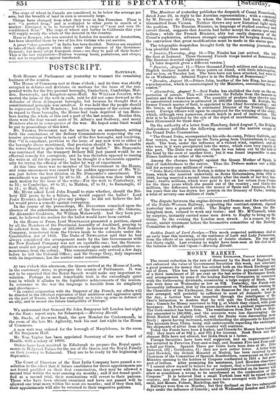POSTSCRIPT.
The House of Common. met at three o'clock ; and its time was chiefly occupied in debates and divisions on motions for the issue of the sus- pended writs for the five peccant boroughs, Canterbury, Cambridge, Mal- don, Barnstaple, and Kingston-upon-Hull. Sir WILLIAM TOLIFFE, who moved the issue of the writ in each, said he did not come forward as the defender of these delinquent boroughs, but because he thought that a constitutional principle was involved. It was held that the people should be represented by 658 Members ; but in consequence of the course taken in regard to these boroughs, the House had been deprived of ten Mem- bers during the whole of this and a part of the last session. Besides this, there were the four vacant seats of St. Alban's and Sudbury, and many Members absent in consequence of the war. He hoped some limit would be put to proceedings of this kind.
Mr. THOMAS DUNCOMBE met the motion by an amendment, setting forth the conclusions of the Bribery Commissioners respecting the ex- tensive prevalence of bribery in each of the five boroughs, and resolving, that "it is expedient, previous to the issue of any new writ to either of the boroughs above mentioned, that provision should be made to enable the voters thereof to give their votes by way of ballot." Mr. Duncombe was convinced that the trumpery Bribery Bill just passed would be no effectual remedy for corruption, and he was therefore opposed to issuing the writs at all for the present ; but he thought it a favourable opportu- nity for trying the efficacy of the ballot by way of experiment. At this time there was no member of the Government in the House, and some amusement was caused by the sudden appearance of Mr. Wil- son just before the first division on Mr. Duncombe's amendment. The amendment was negatived by 40 to 33. A division was then taken on each motion for the issue of the writs—For the writ to Canterbury, 45 to 32 ; to Cambridge, 46 to 31; to Malden, 47 to 31; to Barnstaple, 47 to 31; to Hull, 50 to 30.
Mr. Horan asked Lord John Russell to state whether, should the Bri- bery Bill prove to be a failure, he would support the ballot? Lord Tom{ RtssELL declined to give any pledge : he did not believe the bal- lot would prove a remedy against corruption.
In the course of the proceedings, Mr. DUNcOMBE remarked upon the absence of the subordinate members of the Government—Mr. Osborne, Sir Alexander Cockburn, Sir William Mcdesworth : had they been pre- sent, he believed the motion for the ballot would have been carried.
• In the House of Peers, Lord MONTEAGLE presented a petition, signed by all the Members of the Provincial Assembly of Auckland, praying to be relieved from the charge of 263,0001. in favour of the New Zealand Company, transferred from the Crown lands to the colonists under the Constitution Act of 1662. The Duke of NEWCASTLE said that he had always considered the arrangement made by the late Government with the New Zealand Company was not an equitable one ; but the Govern- ment could not propose any alteration except upon some authoritative re- monstrance from the colony. This remonstrance only arrived a few days before he left the Colonial Office ; and Sir George Grey, duly impressed with its importance, has the matter under consideration.


























 Previous page
Previous page